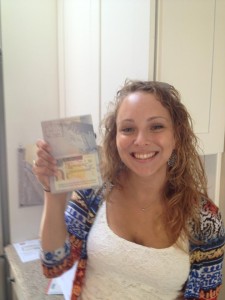Pre-Departure
Packing
Packing for a 3 or 4 month trip is much different than packing for a week-long vacation. You’ll probably need to pack for more than one season depending on where you’re studying abroad, and you’ll want to be prepared for many different activities. So where to start? Here’s a list that you might start with, but please remember to edit depending on the weather where you’ll be living, and the types of activities you plan on doing.
- 3 pairs of jeans
- 5 shirts
- 7-10 sets of underwear and socks
- 1 pair of shorts
- 1-2 bathing suits
- 1 pair of flip flops (especially if you plan on staying in hostels)
- 1 pair of sneakers
- 1 pair of dress shoes for men/heels for ladies
- 1 pair of flats (especially ones you won’t mind wearing out at night)
- 1-2 nice outfits
- 2-4 “going out” outfits
- 1 sweatshirt
- 4-5 pairs of pajamas
- 1 work-out or physical activity outfit
- refillable travel-sized bottles with screw tops
- a backpack
- 2 or 3 travel adapters (ones that do not convert voltage for phone charges/laptop chargers/camera chargers)
- 1 travel voltage converter
The clothes you bring might not fair as well in foreign washing machines as they did in American, as the water is usually only very hot and the cycles are very harsh. Especially if you’re staying with a host family that is doing your laundry, be aware that some of your more delicate items may be ruined by the laundry cycle, so choose wisely!
And here’s a sample list of things that you should probably buy once you arrive:
- Shampoo/Conditioner
- Toothbrush/toothpaste
- Sunscreen
- Hair dryer/hair straightener
Remember that the voltages in most overseas countries are higher than in the States, so heat-producing appliances like blow dryers from the US may overheat with the higher voltage abroad. Buying an inexpensive hair dryer abroad may be worth the investment to avoid accidental fire or hair-melting!
Also remember that bringing things which will distinguish you as American are best avoided in most places. At the very least, they’ll ensure that everyone in your host city knows that you’re not local before you even open your mouth. At the worst, they’ll make you a target for theft, or worse. These items might include sports team apparel, sorority/fraternity apparel, anything with university logos on it, or t-shirts with writing in English. It’s typically best to wear nondescript clothes so that you’ll be able to blend in wherever you go. Be sure to be aware of the expected level of modesty in your host culture. You’re going as a visitor, and you should absolutely respect their customs. If it is not appropriate to have uncovered shoulders or short shorts, it’s best not to bring them at all. You don’t want to make yourself or your host uncomfortable.
Fitting all of your things in one bag might be a challenge, but a good way to save space is with the Bundle Packing method:
Visas
Whether or not you’ll need a visa will depend on several factors, namely which country you’re studying in, how long you’ll be there for, and your own nationality. For Americans, if you’ll be in a European (EU) country for less than 90 days and you’re not going to be employed while you’re abroad, you probably won’t need a visa. If you’ll be abroad for longer than 90 days, or you’ll be employed while you’re abroad, then you’ll likely need to apply for a student visa. This visa may or may not allow you to work depending on the regulations of the country you’re visiting. Outside of the EU, you’ll probably need a visa no matter how long you’ll be in the country for. Americans should check the specific visa requirements of the country they’re studying in on the US Department of State Travel website. For students holding an EU passport, you will likely not need a visa to study abroad in another EU country. You may also be eligible to work in other EU countries due to the free movement legislation enacted by the EU. For EU citizens traveling outside of the EU, you’ll probably need to apply for a visa for study in your host country (depending on the country’s specific visa requirements). Citizens of countries outside of the United States should check their own government’s travel websites or the website of the host country’s embassy in their home country for specific information.
The visa processing time for most student visas is between 30 and 90 days, so give yourself plenty of time to get together the materials that you need. The key to a successful visa application is being hyper-organized. Make a folder with a checklist on the inside, and mark off each required document as you put it in the folder. I would also recommend making a copy of each document so that you have an extra just in case! If you’re going to need an appointment at a local consulate or embassy, try to book the appointment as early as possible to ensure that you get an appointment when you need it (appointments for certain embassies in certain cities can fill up quickly). Remember that all students who need visas are probably applying for theirs at the same time you’re applying for yours, so this is a busy time for consulates and embassies!
After receiving my UK visa in 2013. Receiving your visa will likely feel like the best day of your life after the hassle of applying for it!
Other Practical Advice
- Students are often very worried about what they’ll do for a cell phone while they’re abroad. You really have two options to get a local phone number- you can buy a cheap non-smart phone and put pay-as-you-go minutes and texts on it. You can also get a SIM card for a smartphone (as long as your smartphone is already unlocked by your provider in your home country), and then you’ll be able to have pay-as-you-go data, calls, and texts. If you choose to go with the SIM card option, you will absolutely want to make sure that your phone is already unlocked, otherwise the phone won’t accept a SIM card from another provider, and it’ll just give you a frustrating mess to sort out if you want to attempt to get the phone unlocked while you’re abroad. I definitely don’t recommend relying on international calling/texting on your phone from your home country. This feature is good if you’re traveling for a couple of days, but you’ll want a local phone number if you’re studying abroad. It’ll help you communicate with your new friends from abroad, with your host institution if necessary, and with things like calling taxi’s or other such services. Using only international features on your home cell phone will also be extremely expensive. If you choose not to get a SIM card for your smart phone, you’ll still be able to connect to wifi while you’re traveling, so it won’t be completely useless!
- You probably won’t need to open a bank account in your host country, unless you’ll be working while you’re studying abroad, or you’ll be there for a year (or longer). Opening a bank account might be a challenge if you don’t have a permanent address, anyway. If you do need to open one, avoid the banks that charge fees for international students to have accounts, it’s just a way to get a bit of money off of you each month in exchange for the same account they give to everyone else for free. Don’t be afraid to shop around for the best deal!


